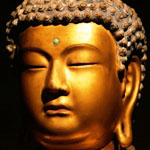It seems to me that the teaching’s emphasis on strengthening peripheral awareness would be more of a challenge to some meditators than to others.
As someone with a neurotic, anxious nature, peripheral awareness is a given for me. The slightest change in my external or internal environment almost never goes unnoticed and usually stimulates a feeling of alarm, more or less. While this quality has served me well when it comes to physical and psychic survival, I have also viewed it as a curse when it comes to the induction of altered states such as trance, ecstasy, flow, and ordinary sleep. So it was a relief to finally hear Culadasa’s affirmation that peripheral awareness is not only OK, but essential.
I would guess that peripheral awareness is more of a challenge to those who can naturally drop into states of absorption or trance, though of course I cannot speak for them. And, of course, I could be deluded about the usefulness of my own awareness; it does tend to scan for threats and annoyances.
 Dor K
11 months ago
Dor K
11 months ago Salina D
5 years, 9 months ago
Salina D
5 years, 9 months ago Salina D
5 years, 10 months ago
Salina D
5 years, 10 months ago Dennis
6 years, 1 month ago
Dennis
6 years, 1 month ago lemmefly
6 years, 1 month ago
lemmefly
6 years, 1 month ago